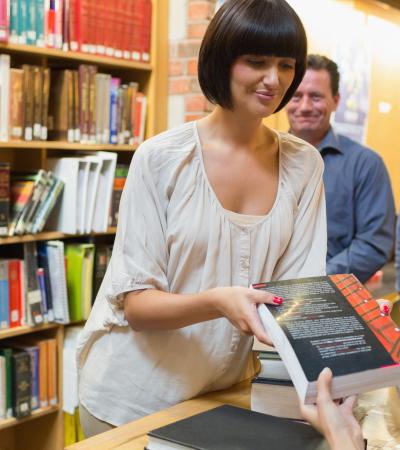Following the trend that encourages communities to shop and eat local, Princeton Public Library has a day each spring where our community can meet local authors and take the opportunity to truly read local. It is a full day of events and a great chance to meet the local literati, with over 40 in attendance each year. This is a day where local authors get a chance to shine and share their talent with the community. This event focuses on books written for adults. We hold a separate book festival for children and young adults each year in addition to Local Author Day.
Advanced Planning
This event is planned and executed by two staff members over a three-month time period. A press release announcing the date and asking for authors to apply for the event is sent out three months in advance. Authors have one month to fill out the form and apply.
When the application process is finished, the two staff members review the applicants and determine who will be selected to participate based upon several predefined criteria. Acceptance emails are sent out seven weeks before the event so that marketing may begin. Following up with each author (so that they are aware of how the day will work, etc.) takes a fair amount of time in the final weeks before the event. The biggest challenge is that we have space for 40-45 authors to participate and often have more than double that apply.
Our goal for this program is to support our local writing community in a vibrant and fun way. We have found that having solo author readings with local authors on their own does not attract a good audience. By bringing together all the authors at once, they get much better exposure as well as a chance to network.
Marketing
We include Local Author Day in all of our usual library public relations PR (quarterly magazine, online events calendar, blog, Twitter, Facebook, press release, printed poster). We reach out to the local newspapers and ask them to profile the day. We select four authors to be the featured authors — they are usually authors who are better known locally or have been published by a traditional publisher — and they are often profiled in the local papers prior to the day.
We create a hashtag that we use extensively on social media both prior to the event and on the day of the event (for instance #LADppl14), and we also create a pin board on Pinterest that profiles each author. After the event, we create a photoset on Flickr that highlights who attended. We explain to the authors that our marketing is one of the benefits of being included, and they are all thrilled with the social media exposure we give them.
Budgeting
This event could be done with an extremely small budget if desired, especially if the day was kept to being an expo of local authors without additional events being added. In our version of the event, we pay a $200 stipend to bring in two speakers to lead workshops in the morning for the authors and others in the community. A sample topic might be using social media to promote yourself as an author. These morning workshops are very popular with our community but are not an essential part of the day. Other than printing fliers, the marketing costs are minimal as it is mostly done via social media. We do spend about $150 on snacks to give the authors while they are at the event. The author fair is several hours long, and we have found that they appreciate it if we have some water and small snacks on hand for them while they are talking and signing.
Day-of-event Activity
The morning of the event, we have the room set up for workshops in a classroom style with a way to display slides and use technology as needed. Once the workshops are done, we quickly change the room so that tables are set up in rows for the authors. Each table is covered with a tablecloth and signs are placed on each to identify where authors are to sit. Each author has a space where they can sell and display their book(s) and a chair to sit on. We also set up a reading area in the lobby where authors who were selected via a drawing go to give short readings throughout the afternoon.
Program Execution
On the day of the program, we have two teen volunteers and two staff members at the event. Authors are given 30 minutes to set up their table. They are expected to bring their own books and display materials. The library allows them to sell their books at whatever price they wish and to keep the profit for any they sell. Authors need to bring their own way of making change or accepting credit cards. This information is laid out in detailed emails prior to the event.
The author fair is three hours long, and during this time, authors are speaking to people, signing books and giving readings (if they have been selected to do so). Attendance at Local Author Day is generally around 400 to 500 people for the author expo in the afternoon. Morning workshops usually have 25 to 50 people registered depending on the topic. Our goal of having a way to give exposure to local authors is achieved through this program and it also builds a sense of community among writers.
Advice
Determine a general time frame of when you will host a Local Author Day (e.g., spring). That way, if a local writer inquires about doing a reading, you can tell them about Local Author Day and offer to add their name to an email list for notification when the application goes live. Establish your criteria for accepting authors if you plan for this to be a selective day. For instance, we give preference to authors that live within a 10-mile radius of the library, and we also require that they have a recently published book. Be prepared for authors who are not accepted to be upset and have responses prepared.
Contact each author that applies, even if they are not accepted, to thank them for applying and explain the decision matrix, if needed. Encourage authors that are accepted to promote the event widely within in their own networks and provide them with the means to do so. You can do this by sending copies of the poster that can be sent via email/posted to social media, creating a hashtag or providing them with appropriate wording to invite people.




